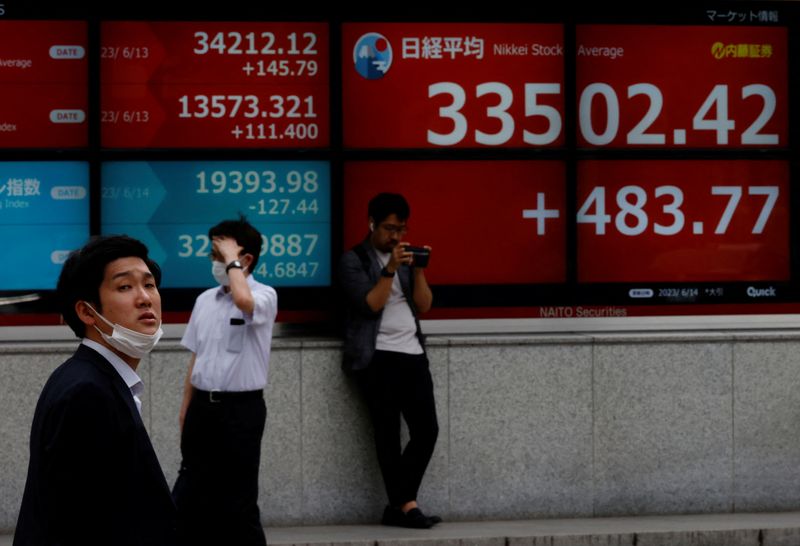By Caroline Valetkevitch
NEW YORK (Reuters) -Global stock indexes advanced, Treasury yields declined and the dollar weakened against the Japanese yen on Thursday after a larger-than-expected drop in U.S. retail sales in January prompted a slight repositioning of expectations for interest rate cuts.
The U.S. Commerce Department report showed retail sales dropped 0.8% last month, the biggest fall since February 2023. Economists polled by Reuters had forecast retail sales dipping 0.1%.
However, winter storms were seen as possible factors affecting the data, with economists noting that a fairly healthy labor market remains supportive for consumer spending.
A separate report showed initial jobless claims fell 8,000 to a seasonally adjusted 212,000 for the week ended Feb. 10, slightly below the 220,000 estimate.
Investors are closely watching economic data for clues on when the Federal Reserve might begin cutting rates.
Bets for an at least 25-basis-point rate cut in May edged up to 40.6%, while odds for June stood at 82%, according to the CME Group's (NASDAQ:CME) FedWatch Tool.
A warmer reading of U.S. consumer prices earlier this week prompted traders to cut the chances of a prompt rate cut from the Fed, which lifted the dollar and sparked a sell-off in the fixed income market.
Traders also are once again watching the dollar/yen rate as it topped 150 in the last few days, a critical level that puts the market on alert for possible Japanese intervention to weaken its currency.
The yen strengthened despite unexpectedly weak Japanese gross domestic product figures for the fourth quarter of 2023, which saw the country overtaken by Germany as the world's third-largest economy.
Against the Japanese yen, the dollar was down 0.41% at 149.94. The dollar index fell 0.38% at 104.28, with the euro up 0.4% at 1.0768.
The yield on the benchmark U.S. 10-year Treasury note fell 3 basis points to 4.234% and was on track for a second straight decline following a jump on Tuesday after the consumer prices reading.
"Clearly the retail sales came in somewhat below expectations and fits with our narrative that this is going to be a slower growth environment as we traverse 2024, but one where we still expect that there will be persistent economic growth, meaning that our base case is avoiding a recession in mid-2024," said Bill Northey, senior investment director at U.S. Bank Wealth Management in Billings, Montana.
The Dow Jones Industrial Average rose 348.85 points, or 0.91%, to 38,773.12, the S&P 500 gained 29.11 points, or 0.58%, to 5,029.73 and the Nasdaq Composite gained 47.03 points, or 0.30%, to 15,906.17.
MSCI's gauge of stocks across the globe rose 5.85 points, or 0.79%, to 750.80. The STOXX 600 index gained 0.68%.

Earlier on Thursday, Japan's Nikkei rallied to its highest level in 34 years, and the stock index now sits just 800 points below its all-time high in 1989 that marked the peak of Japan's so called "bubble economy."
Oil prices rose as the U.S. retail data prompted a sell-off in the dollar. U.S. crude gained $1.39 to settle at $78.03 a barrel and Brent rose $1.26 to settle at $82.86. Spot gold was up 0.6% at $2,004.05 per ounce.
